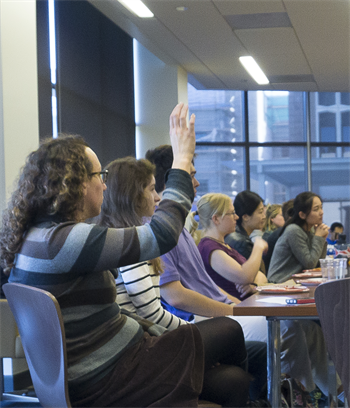They say there’s no such thing as a free lunch.
They also say that knowledge is the food of the soul.
What if you could have both?
Lunch & Learn is an informal seminar series that provides grad students with two important things: free lunch, and a chance to socialize with and learn from their peers from across the campus.
The series is offered once a quarter and is co-sponsored by the Graduate Division, the Graduate Student Association, and the UCSB Library.
Did you know?
Each Lunch & Learn features 15-minute talks by two graduate students – one from a STEM discipline (Science, Technology, Engineering, and Mathematics) and one from a SHEF discipline (Social Science, Humanities, Education, and Fine Arts). We have a combined Q&A with both speakers to promote cross-disciplinary learning.
Unlike traditional seminars and lectures, Lunch & Learn encourages speakers to communicate their topic in whatever way they feel most comfortable.
We welcome everything from slideshows to fireside chats to hands-on demonstrations.
Bring your passion and curiosity!
Check out Shoreline to find out when the next Lunch & Learn event will be
Interested in presenting at an upcoming event?
What is it about your research that motivates you to get up every morning (even on weekends) and go in to the lab, the library, or your field site? What are the parts of your research that you may not get to talk about as much? Well, we want to know!
Lunch & Learn offers you the opportunity to present your research the way you want to a smart, friendly, and non-specialist audience of your peers. It's great for practicing public speaking and expanding your CV. We are currently seeking speakers for our upcoming events, so sign up today to present at an upcoming Lunch & Learn!
More Information:
The Lunch & Learn program runs once a quarter in the UCSB Library Room 1312 (first floor on the mountain side of the building near the cafe). The exact dates are advertised on the GSRC Shoreline page, typically 2-3 weeks in advance. We ask attendees to RSVP on Shoreline ahead of time.
The Graduate Student Resource Center team is happy to help you do a dry run of your presentation ahead of time. You can email gsrc@graddiv.ucsb.edu to set up a time.
The Library also has a Presentation Practice Room available for reservation by UCSB students, faculty, and staff. Located on the 1st Floor Mountain Side (room 1506), the space allows you to practice, refine, and record oral and multimedia presentations for classes and seminars, conferences, teaching preparation, Lunch & Learn, Grad Slam, thesis defenses, and other events. Learn more here.
- Remember the goal of the talk: We want the presenter to gain practice in public speaking and to receive constructive feedback from their peers in an informal environment.
- Encourage your peers: Share positive feedback in the chat and/or express your support for their talks.
- Be self aware: Avoid language that might be racist, sexist, cissexist, transphobic, homophobic, acephobic, classist, ableist, ageist, sizeist, ethnocentric, and/or anti-religion. GSRC staff are happy to discuss this further if folks need clarification on any of these categories or would like to discuss strategies for using inclusive and supportive language.
- Remember the goal of the talk: To practice public speaking, expand your CV, and help you experiment with different formats and topics
- Avoid jargon: You will be presenting to a non-specialist audience of your peers so be sure to avoid discipline-specific language or define it if it must be included
- Be mindful of time: Please ensure you do not go over your 15-minute time allotment
- Be self-aware: Avoid language that might be racist, sexist, cissexist, transphobic, homophobic, acephobic, classist, ableist, ageist, sizeist, ethnocentric, and/or anti-religion. GSRC staff are happy to discuss this further if folks need clarification on any of these categories or would like to discuss strategies for using inclusive and supportive language.
